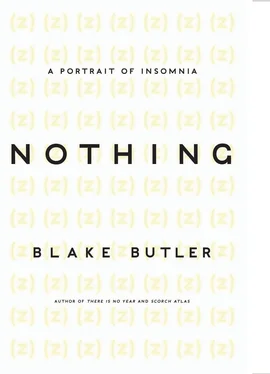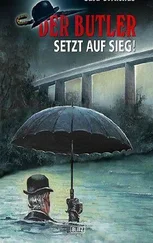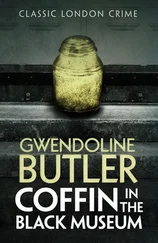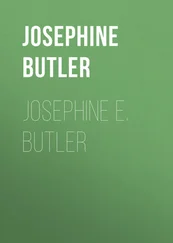This is what we want from sleeping pills — lights out, mind out, exit. Obliterate the room. No option. Help me forget me. Under the reign of endless choices, we want none. This is the function of the medication — it delivers an intended punctuation of effect. It is to flip a switch, a removal of the I, and so therein the removal of the remembering of dream state seems distinctive, integral to this kind of sleep — as in the removal of the struggle, of the self ’s descent into self, the descent is rendered slightly other, slightly off. Sleep becomes less the state of reckoning of unconscious self in its translation, and more a coverlet, a box. Pill sleep, even when remembered, wears a ring around it, another rubber, something off inside the waking self eating the curve of what the day fights to hold onto in the leak. In one instance, in 2010 in China, a man was stopped from killing himself when he took fifty sleeping pills before going to throw himself off a roof, unable to decide between two twin ways to die. The pills knocked him out before his death drive could be completed and were not strong enough to do the job themselves, so he survived, living now with his wife inside that knowing.201 Herein the snuffing of the self provided the self ’s ultimate defense, blocking in the nothing of the nothing before the last black.
If sleep is for the self, then invented sleep is an invented version of the same, slightly askew, like digging into memory flesh you have not yet worn, or wore in other years, none of it quite yours. In one commercial for Lunesta, a neon lime-green butterfly flits around a bedroom among the glow of magic forests. As the insect hovers over the shape of a sleeping woman, a breathy, listless female voice-over monologues in monotonizing ad-speak the pleasures of our rest, and on in equally dreamy drabble begins to list its legal-bound strata of side effects, including dream-driving, dependency, contemplation of suicide, and so on. Oblivious to such threats, the butterfly flits down to tuck the woman in. The enormous neon bug then wobbles off to some other nowhere, remaindering the house in much less light. Lunesta does not portend to hide its strange presence even in waking, where its chemic chalky aftertaste resides inside the mouth — a second breath fit over the day’s breath. This chronic flavor, at first terrible and in want of masking in early users, can become, in its familiarity, a waking residue, a pleasured thing, a sublime tang.
Lunesta dug into my blood. These I ate quicker, with the promise of more mostly when I needed. I packed the sample packets in the long drawer of the bathroom and counted them along the road, planning nights before I’d need more. Under this black banner, everything was fine. Perhaps still slower in my days, and of a gross kiss with the stink all on my gums, but when I lay down I could be down, and stay there. Good. I talked more out loud than I would normally. In the days I would find sentence fragments written on slips of paper, in folds of books, or on my hands. Things were remembered or they were not. The room I lived in had high ceilings, and in the nights the sounds of slamming doors and people shouting would bump around the night. In the pill there was the whir. My computer sat on my bedside desk, at all times watching, its beeping lights flecking the dark. I could turn it on or off. I heard its guts sigh. I got up and got down.
Each time I ran out of the samples, I would thereafter swear no more. Then I would spend the five nights between eating, screeching, sobbing. I would get another couple and feel okay again. The supply was not as deep as it had seemed. I would wait, or wonder, calling my friend with supplies, asking. Days knowing I wouldn’t have an easy out to end it made halls in buildings seem to stretch a little longer, oddly colored — food might taste slightly off, or sound might seem more loud. Sometime two days deep in no pills I went to renew my vehicle at the county tag office, a massive building located in the heart of downtown, with no easy parking. Sidewalks to glass doors to escalators, same in day as in the night. Suddenly I found myself sitting at the glass window talking through it to a large woman and I was supposed to give her my ID, and I couldn’t find my ID, it was gone, and I have a ton of shit in my wallet and I was taking all of it out and sweating and talking to myself and my hand was bleeding as I’d cut it open somehow coming through the metal detector to get into the building, and the woman said, “Sir, you can take your time,” and I was laughing and almost crying and my stuff was everywhere and I was sucking the blood out of my hand so it wouldn’t drip and I looked at her and said something like, “God took my ID,” and the woman didn’t blink and the woman just watched me put my stuff back in my wallet and stand up and leave.
That same day, in the grip of desperation, I went to a local walk-in clinic, having been so long without a regular doctor that I didn’t know where to begin. I weighed in in the lobby. I weighed more than I realized, in all my clothes. They took me to another smaller room in their room queue where I would need to sit and wait. A woman who was not the woman who could give me pills wrote down things about me. I told the story of my young sleep rot oncoming, and the things I’d done to no effect. She watched me, scribbled, offered questions. She left me in the room. Some time passed with sounds through walls therein repeating. Voices in the house. Voices from bodies also sick in their own ways, asking, needing answers, needing help. I felt funny in my body there in the small room waiting. I shifted places, sat on paper. I flipped through the spindle of magazines supplied to keep your mind attuned in passing time. The doctor came in without knocking. She asked the same questions there again. She looked at the page and wrote notes down. There we were. I probably fidgeted. I tried to sound right. After further stringing, checking my chest sound, my holes and eyes, my frame, she told me she would give me a few more samples. Then I would need to see another doctor. She left the room. I waited more time. I tried to stretch some, seeing herein that the end to this light was coming soon. After this I would not need more pills, I decided. I would wean me off in rungs. This, a last door. A help to helping. Listen, I said to myself. The first nurse came back in quiet. She handed me a page, a bill. She left in quiet, left the door cracked. The paper said, “No Lunesta. Recommend Tylenol PM.” I walked out unwatched from the office, feeling a further kind of air, sunk slightly deeper. Just past the front desk, where the new sick were, I did not argue, paid the bill. I stopped to piss in their men’s room, talking to no one, my limbs reflected in the bathroom mirror in that light. There I was, me. There.
]
]
]
I never took the pills again. I don’t know what I have been doing. Time since then has came and went — both in past tense. There have been people with their bodies and the hours and some food. I eat still and get tired. I run and smell the sound. Sometimes I sleep better. Sometimes the air inside my home and this bed’s placement are conceived ill even just walking in the door. Days go by and by inside the body. The day begins again and ends again. The beginning often feels more like the end, while all the moments between then and the end itself feel more like nothing, though there is speaking, and there are buttons, and there are people, and there are rooms.
The waking sleep and sleeping wake feed on each other. Where neither ever fully is the either or the other or itself. This veil of space wedged between spaces. A series of selves circling a leaving self. As to each eye and mouth and tongue and body there connected, the brain flesh wrinkling again. Bound in that mother body, every hour spent around her, every word, the light of rooms where you have stood together, the things you did or did not say in return. A mode of intuition held in instance. A whole life contained inside one nod, one second walking in a night. Always still another house inside this house. All those holes as little portals, rooms where one might stop and lie or turn around. Where through any wall could be another person, mouth wide open, among weather, light, water, and time. An unseen corridor around our walking. The event of no event.
Читать дальше












